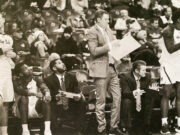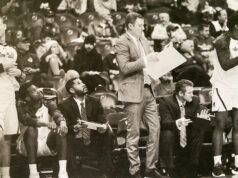by Miguel Humara, Ph.D.
Remember when you were little at gym class? In my school, the teacher would select a couple of captains at the beginning of each class to pick teams. Most of us would pick the best athletes and then our friends to be on our teams. We wanted to win and have fun. Today, we have favorite college and professional teams that we want to see win. Teams today are not only under pressure from fans and the media to succeed, they are under the financial gun as well. The world of professional sports has become big business and generally speaking success on the field translates to financial success. Athletic directors and general managers at all levels have been faced with the question of how to improve their teams’ success.
One obvious way of doing this is to select the best athletes for a team; but what exactly does this mean? Simply put, you want the right bodies in the right places doing the right things. There are many athletes that have received scholarships or signed big money contracts only to later turn out to be a “bust,” a player who did not live up to expectations. On the other hand, everyone has heard stories of athletes that were told they lacked the physical skill to succeed at the highest levels but went on to prove every body wrong. Wayne Chrebet and Doug Flutie are just two examples of individuals that were told they were too small to make it in professional football. Through their drive and determination they went on to be highly valuable contributors to their teams.
The ability with which teams are able to identify athletes that will be useful additions to their teams is critical to their success. For many years, businesses have been using skills assessment in order to identify appropriate personnel for company positions for years. In sports, this translates to making picks based on a combination of an athlete’s physical and psychological abilities. Gone are the days when teams could get away with picking their athletes based on a coach’s judgment alone. Although coaches are experts at being able to judge an athlete’s physical abilities, they lack the expertise necessary to asses the psychological abilities that have been shown to differentiate the winners from the losers. Selection of athletes based on the measurement of physical and psychological criteria has been found to distinguish between successful and non-successful athletes with an 85% accuracy rate.
Physical Abilities Related To Success
Speak to any psychologist and he or she will tell you that the best predictor of future behavior is past behavior. In other words, human beings tend to do the same things over and over again. This holds true with the athletic arena as well. Prior performance is a powerful predictor of success. Statistics such as Batting Average or Yards Per Carry and standard measurements such as speed on the forty, vertical leap and throwing speed are useful in predicting future behavior.
Although the physical abilities necessary for each sport are different, they are important factors in any selection decision. For example, the ability to throw a ball hard and fast is very important in baseball but of little use in basketball. Even within the same sport, the requirements of each position can be very different. In football, the ability to throw a ball long distances accurately is very important for quarterbacks, but is of little use to a defensive lineman. Any coach worth his weight knows this and looks for different physical abilities for different positions. However, often decisions are made based on judgment rather then hard data. This makes almost no sense at all with everything that is at stake in sports today.
In school, different parts of tests were worth different amounts. Multiplication/Division questions were worth a different amount then Word Problems. You’d be very upset if your teacher didn’t grade the whole test and instead just gave you a B/C based on an overall judgment. You wanted to know that you got an 81. We all want an exact score. Why should athletic selections be made on judgment alone then? Different physical abilities should be worth different amounts based on their importance within a given sport. For example, soccer is a game of continuous movement requiring a great deal of endurance but not a great deal of physical strength. Football, for the most part, requires less endurance and much more physical strength. Clearly, these two sports should weigh each of these abilities differently.
Coaches are experts at what physical abilities are required to achieve success in their sports. Furthermore, they are experts in what is required to physically play each position. Working with a sport psychologist, they can identify, measure, and weigh these abilities to come up with a score that can be used to rank individual’s physical capacities. Sport psychologists and coaches should also work together when it comes to deciding the psychological abilities that are necessary for success at a given position in a sport.
Psychological Abilities Related To Success
Generally speaking, athletes have a tendency to be less anxious and more independent, aggressive, and extroverted with a tendency to be concerned with their achievements. So how do we begin to differentiate between these individuals and identify who will succeed and who won’t? One good place is to look at the qualities that stars in a given sport posses. These need to be measured and weighed in terms of their importance for success in order to be of value in selection decisions.
Stories told by professional athletes indicate that those who were successful were very self-confident and had thoughts of their sport through the day and in their dreams. Elite athletes have predictable feelings during peak performances which include the following:
- Confident and optimistic
- In control
- Supported by family, friends and coaches
- Relaxed both mentally and physically
- Finely tuned senses
- Intense sustained concentration
- Determination to excel
Measures of many of these abilities already exist and should be an integral part of any selection decision.
In today’s sports world, athletes often move from one team to another. Often the offensive and defensive systems can be vastly different. This is true when an athlete makes the jump from high-school to college and from college to the pros. An athlete therefore needs to be intelligent in order to be able to learn and use these new systems. For example, some people had trouble keeping track of the hand signals that their little league team used. Athletes need to be able to keep track of things like this in order to be successful. Therefore, a rough measure of intelligence also needs to be included in selection decisions.
Researchers have found that successful athletes have higher levels of aggression, desire and a capacity for leadership, and mental toughness (not easily upset by losing or criticism of their play). In addition, the way that athletes explain their performance influences whether they will quit, continue half-heartedly, or persist and achieve. If they have a high level of self-esteem and believe that they control their fate – also called an internal locus of control – they are far more likely to persevere. The above psychological qualities are typical of all successful athletes regardless of whether their sport is individual (golf, gymnastics, wrestling, etc.) or team (basketball, football, soccer, etc.). However, the qualities that need to be assessed for the purposes of making selections are slightly different for these two groups.
Individual Sports. Most of the research on successful athletes that participate in this type of sport indicates that they have a better ability to cope with the stress that comes from competition. This may be due to their tendency to use more positive self-verbalizations. In addition, the successful ones have a higher level of self-confidence with a belief that they are close to achieving their athletic potential. These findings are not surprising given the nature of their sport. When you are standing out there by yourself, you are solely responsible for your performance. On the other hand, team sports allow an athlete to have an off-day since someone else is able to make up for it. Therefore, assessment of an individual’s level of self-confidence and ability to cope with stress is of greater importance when predicting their likelihood of success in individual sports.
Team Sports.Athletes who participate in these types of events may have problems with performance due to problems with coaches or other team members. Athletes who possess non-conformist or non-affiliation tendencies tend to have more problems with command style coaches who are typically inflexible. Furthermore, these non-affiliation tendencies may hamper their relationship with other team members since they may come to be viewed as outsiders. This can hurt both the individual’s performance and/or the team’s performance. I think any one would agree that when you feel that supported by those around you, your performance tends to improve. On the other hand, when there is an individual that causes dissent in the locker room everyone’s performance will deteriorate. Therefore, it is specially important to consider this factor when selecting an individual for a team.
Conclusion
Traditionally, decisions regarding athletes selected for a team were made using judgment and intuition. In order to compete in today’s hyper competitive sports world it has become of the utmost importance to select appropriate personnel. While coaches have an expertise in many of the physical and psychological capacities that they look for in their players, these need to be measured and weighed appropriately in terms of their importance so that the right athletes are selected. Researchers’ 85% accuracy rate in identifying successful athletes should be used by teams at all levels. By working with a sport psychologist to make decisions on personnel, teams improve their chances of on the field success. In other words, the wins will come if you put the right bodies doing the right things in the right place.













